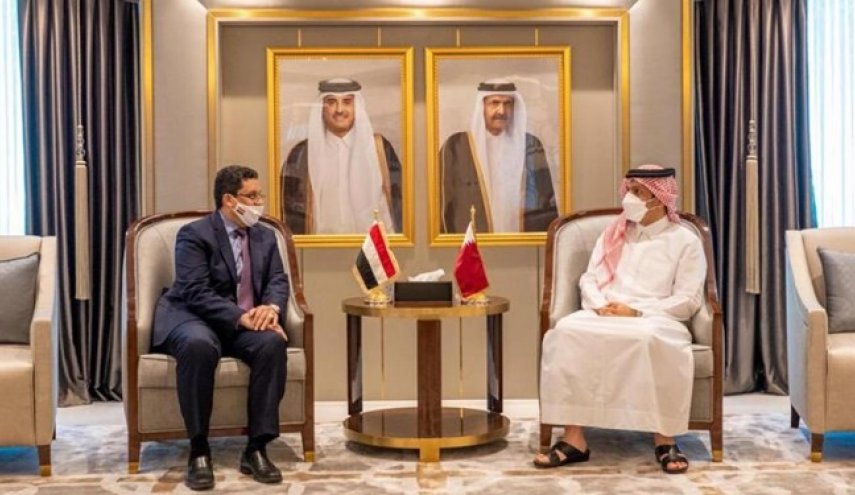AhlulBayt News Agency (ABNA): While as a result of the advances of the Yemeni army and popular committees in the push for Ma’rib province liberation the resigned and fugitive President Abdrabbuh Mansour Hadi faces political and military challenges, he in an attention-calling move sent his Foreign Minister Ahmad Awad bin Mubarak to Qatar on Monday.
Although the top discussion case in Doha visit is said to be the Arab peace process and restoration of Aden-based government relations with Qatar, certainly the principal goal is to attract Doha support to prevent Ma’rib fall to the resistant forces and also strengthen the Saudi-backed coalition cabinet in southern Yemen.
Coalescing with Muslim Brotherhood front to save Ma’rib
Undoubtedly, the fate of Ma'rib, as the last stronghold of Mansour Hadi's forces in northern Yemen, is now vital for the resigned government and Saudi Arabia, given the changing political and military equations of the war after the strategic province’s fall to the hands of Ansarullah Movement, goes to great lengths to save Ma’rib which is traditionally the bastion of Muslim Brotherhood-affiliated Islah Party.
Concerned about the conditions that can follow Ma’rib fall and disappointed with UAE-backed southerners, the Muslim Brotherhood camp in Yemen considers reconciliation with Ansarullah as one option to save its place in the course of political developments. This vision gains traction more and more as Ansarullah and the army forces tighten Ma’rib encirclement.
Meanwhile, Saudi Arabia and Hadi see the closest path to persuasion of Islah to continue its alliance with Aden runs through Doha exercising influence on the party. Shortly after media reported Hadi’s FM visit to Doha and delivery of a message from King Salman bin Abdulaziz of Saudi Arabia, Qatar condemned the recent Yemeni attack on Saudi oil giant Aramco’s facilities.
Although there are doubts about Qatar’s ability to save the falling-apart southern alliance, in the Saudi viewpoint, improved Doha-Aden ties can help cut off the financial, media, and even logistics support of the Qataris to Ansarullah.
In fact, the Saudis believe that Doha played a role in defeating the Saudi military operation in Yemen with the help of Ansarullah after leaving the military campaign of the Saudi-led aggression in Yemen in 2017.
On the other hand, Saudi Arabia hopes to take advantage of the shifting atmosphere of relations with Turkey and Qatar to improve its difficult situation in Yemen. In addition to the fact that Turkey has been a provider of the Saudi military drone fleet in recent years, some media outlets today unconfirmed reports of Turkey entering the region as the Brotherhood sponsor in military support for the Saudi coalition in the Yemeni war. Saudi Arabia is well aware of the fact that advancing regional rivalries with the Muslim Brotherhood in Yemen is not in Riyadh's best interests at all, and mainly serves Emirati plans advancement.
Another reason for the Saudi openness to Doha is Qatar’s potential role in mediation in Yemen’s developments.
Setting a trap for Qatar
Since 2017, the year Saudi Arabia and its allies severed ties with Qatar and imposed a blockade on it, Doha addressed the Yemeni case different from the other Persian Gulf Arab states and sometimes leaned to play a mediatory role between Mansour Hadi and Ansarullah, which has been holding the capital Sana’a and the north since 2014.
Yemen case was one of the most important considerations that led Qatar’s exit from the Saudi coalition in mid-2017. At the time, the Saudi-led coalition justified its anti-Qatari decision by claiming that Qatar was supporting terrorist organizations and was holding relations with Houthis in Yemen.
The withdrawal from the Arab aggression coalition resulted in improved Qatari regional position post-blockade and increased its role in Yemen developments. This status improved Doha-Sana’a relationship and in turn resulted from its separate support to Yemen’s Brotherhood.
And now in post-reconciliation period that Qatar expressed readiness for mediation between Saudi Arabia and Iran, the Saudis are seeking exploitation of this ground to cut the Qatari influence in Yemen and stop its measures that hamper success of the Saudi operations in Yemen. Certainly, sending the Yemeni FM to Doha is not to accept Qatar mediation but to damage the Doha-Sana’a relations.
/129

